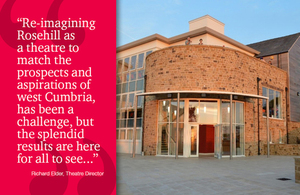Rosehill Theatre, Whitehaven, Cumbria
A refurbishment project to update the existing Rosehill Theatre which would help to revive the performing arts in west Cumbria and involve the whole community in creative ventures.

Rosehill Theatre
Project summary
| Nearest NDA site | Duration | Total investment | NDA contribution | Partners |
|---|---|---|---|---|
| Sellafield | 2016-2017 | £2.7 million (£4.5 million over two phases) | £465,000 | Britain’s Energy Coast, Copeland Community Fund, Coastal Communities Fund of the Department for Communities and Local Government, the Linbury Trust, Garfield Weston Trust, WREN, J Paul Getty Jr Charitable Trust, Savoy Educational Trust, National Grid |

Aim
To create a contemporary theatre that would help to revive performing arts in west Cumbria and involve the whole community in creative ventures.
Outcomes:
- Creation of modern arts venue
- Attracting national and international performers
- 12 full-time jobs created or safeguarded
- Including 5 apprenticeships
- 14 part-time jobs created or safeguarded
- 15 apprenticeships created
- 1,486 sq metres of refurbished floor space
- More than 20 volunteering opportunities
- Skills development support for 50 local people
- Community outreach involving more than 1,000 local schoolchildren
- Additional conference space, attracting 500-plus delegates per year
- Attracting 30% increase in external funding
- 25% increase in use of conference facilities
Background
One of the cultural jewels in west Cumbria’s crown is Rosehill Theatre. Located only a short drive from Whitehaven, the theatre was founded by a Hungarian who established Sekers Fabrics and a silk mill at nearby Hensingham. Sir Nicholas Sekers would probably have preferred a career in the arts to manufacturing, but his wealth enabled him to pursue his first love as a leisure interest, and in 1959 he built a theatre in the grounds of his home, Rosehill House. Supported by Cumbrian business patrons, Rosehill’s red silk-lined interior and its founders connections and charm attracted international performers such as Yehudi Menuhin, Benjamin Britten, Mstislav Rostropovich, Jacqueline du Pré and Cleo Laine – even the fledgling David Bowie. The Queen Mother paid a visit in 1964.
Why was this project important to the community?
Following the death in 1972 of Sir Nicholas, who was also one of Glyndebourne’s founding trustees, the venue slipped slowly into decline. By the early 2000s, it was in need of a complete refurbishment. The trustees and community supporters launched a fund-raising project to create a contemporary theatre that would help to revive the performing arts in west Cumbria and involve the whole community in creative ventures.
What was involved?
During the two-year refurbishment phase, the theatre’s resident staff went out into the community with a series of Rosehill on the Road workshops, concerts and productions, seeking to draw in new audiences and reaching out to schools. They organised performances in village halls, community centres, colleges, schools, historic houses and other Cumbrian venues. Their partners included Cardboard Citizens and the English Touring Opera. Director Richard Elder said:
Re-imagining Rosehill as a theatre to match the prospects and aspirations of west Cumbria, has been a challenge, but the splendid results are here for all to see, with international, national and local performers, and people of all ages taking part and enjoying performing arts.
Key to making Rosehill work are our partnerships with, and the support of, the corporate sector and other key stakeholders, our individual donors, the commercial income from The Green Room and Messel’s Bar, and from producing the diverse, quality performances that attract funding from a range of national trusts and foundations.
Our mission remains the same: high quality performing arts and excellent hospitality, entertainment and fun for everyone; creating a local theatre of national significance.
At the same time, we are aware of our growing social impact, spending four times as much in the local economy and employing 26 staff while providing life-changing apprenticeships, training and first job opportunities.
What worked well?
A visit from HRH Prince Charles was the highlight of events to celebrate Rosehill’s re-opening, followed by the opening show First Hippo on the Moon, an adaptation of David Walliams’ children’s story.
A few highlights since have included a series of recitals by international pianist Paul Lewis; concerts by Anna Tilbrook, introducing a range of other musicians alongside her, including young rising stars; jazz from Stacey Kent and Jacqui Dankworth and cabaret-style dining on stage, with entertainment from singer Tina May. Theatre has addressed issues of contemporary life and provided great entertainment and spoken word has included TS Eliot Prize-Winning Cumbrian poet, Jacob Polley, performing accompanied with original music. A roll call of big name comedians including Mark Thomas and Zoe Lyons, have already visited with more to come and a new regular comedy night introducing new voices.
What could be improved / feedback?
Rosehill continues to run an innovative participation programme Taking Part including Snappy Operas (ten minute contemporary music theatre pieces) with Mahogany Opera and its own children’s choir, or Mini-Messel’s Makers craft sessions in school holidays. A two year Heritage Lottery funded project called Creative Connections, is exploring Rosehill’s connections to the world of fashion and theatre design whilst Rosehill has also used forum theatre with people at risk of homelessness, addiction and with low self-esteem.
It is perhaps no surprise, given all of this, that Rosehill has just been crowned Cumbria Life Venue of the Year.
Next steps
A second phase of the refurbishment project will focus on developing the neighbouring barn, doubling its size to include a courtyard theatre. This new building will become the centre for further community activities while also providing further space to generate commercial income in support of Rosehill’s artistic, cultural and community plans.